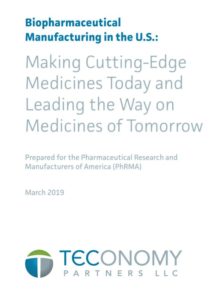A New Report: Advanced manufacturing powering innovative biopharmaceuticals, published by TEConomy Partners and PhRMA illustrates the economic impact of the sector in the advanced manufacturing space.
Tim McClung | May 10, 2019 | The Catalyst
The science-based advanced manufacturing infrastructure of the biopharmaceutical industry is critical to fueling the innovation necessary to bring new treatments and cures to patients. With a footprint stretching across the nation, biopharmaceutical manufacturing produces the cutting-edge medicines developed hand-in-glove within the research and development (R&D) ecosystem, providing high-wage STEM jobs, a growing source of exports and sustained investment and productivity gains. To shed light on biopharmaceutical manufacturing in the U.S., PhRMA released a new report on this vital facet of one of America’s most innovative sectors.
The Federal Government’s National Science and Technology Council (NSTC) identified biopharmaceuticals as a priority advanced manufacturing area. In doing so, the Council recognized along with the Brookings Institution and noted economists that U.S. economic growth and prosperity depend upon advanced process engineering and complex manufacturing, which provide the infrastructure for continued innovation. According to NSTC, “Advanced manufacturing—which includes both new manufacturing methods and production of new products enabled by innovation—is an engine of America’s economic power and a pillar of its national security. Advances in manufacturing enable the economy to continuously improve as technologies and innovations increase productivity, enable new products, and create entirely new industries.”
Biopharmaceutical manufacturing stands out as a specialized, complex and highly regulated endeavor with outsized economic contributions. Between 2000-2016, biopharmaceuticals outpaced all other manufacturing sectors in economic output. Biopharmaceutical manufacturing investments in infrastructure were about 50% higher per worker in 2016, compared to the average across all manufacturing. Economic spillovers from these inputs drove construction activity at new and refurbished biopharmaceutical facilities totaling more than $22 billion across 11 states over a 6-year period. Additionally, significant activity in other industries, from packaging and labelling to various ingredient and equipment manufacturers, to high-precision measuring and analytic tool and production components occurred. Among R&D-intensive industries, biopharmaceuticals were the largest exporter of goods in 2017.
The complexity of biopharmaceutical manufacturing reflects the fact that chemistry and biology are the primary processes harnessed in developing and manufacturing medicines, conducted under a regulatory system with strict requirements, high standards and rigorous approvals by the U.S. Food and Drug Administration (FDA). More than 1,100 facilities across 44 states, the District of Columbia and Puerto Rico are currently manufacturing FDA-approved medicines and related products. Beyond this extensive footprint, these facilities are part of a robust innovation ecosystem that brings cutting-edge medicines to patients.
To keep up with as well as advance R&D into new areas, process innovations are as important as product innovations. Biopharmaceutical manufacturers constantly research, develop and adopt new technologies and processes, such as continuous manufacturing, high-volume cell processing, and advanced purification, preservation and distribution modes, all of which are key to manufacturing medicines. Emerging technologies such as new cell and gene therapies are made possible through novel manufacturing processes and capabilities.
Continued innovation throughout the biopharmaceutical life cycle, particularly in the manufacturing process, creates opportunities for new and emerging companies. From 2000-2018, almost $3 billion in venture capital was invested in more than 100 biopharmaceutical startups involved in the development of innovative manufacturing processes or related activities.

